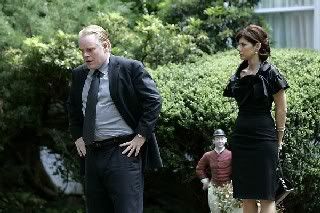Expectations were high going into Saturday night’s ten o’clock showing of Before the Devil Knows You’re Dead. With clichés like, “A return to form” being thrown around, I couldn’t help but be hopeful. So hopeful in fact, I too jumped on the cliché ridden bandwagon to convince a certain movie-hating (but television loving) friend of mine to see the film.
Boy was my face red. A more apt cliché for the film would be, “A disappointment.” Now I agree with fellow Kula contributor John Lin that somewhere in there is a better film, but as the old adage goes, “Almost doesn’t take it to the bank.”
I find writing negative reviews difficult because I believe failures in form are symptoms of a greater failure in content, and Before the Devil is no exception. The film is born of contempt, not only for the characters, but for the viewer and humanity in general.
Before the Devil has been described as “a Greek tragedy” and to some extent the glove fits. Somewhere in the film a family destroys itself, people die, and everyone is flawed. Now I’m not asking for sunshine and rainbows, but I am asking for an even handed depiction of the world we live in.
There is a certain perspective to tragedy and to a greater extent the world, that can be best be described as "classical" or "mythic." In Greek tragedies or Shakespeare or even No Country for Old Men, there is a sense that what you are perceiving is not so much a random occurrence or the mere result of the actions of man, but instead the movement of forces unseen. There is a timeless quality to these forces, that they have been here long before and will be here long after us.
Someone once said, "We do not speak, but are spoken through," which I was reminded of while reading the following passage of War and Peace earlier today:
Pierre first wanted to sit somewhere else, so as not to inconvenience the lady, wanted to pick up the glove himself, and to bypass the doctors, who were not standing in his way; but he suddenly felt that that would be improper, he felt that that night he was the person responsible for performing some terrible rite which everyone expected, and that he therefore had to accept services from them all. He silently accepted the glove from the adjutant, sat down in the lady's place, putting his big hands on his symmetrically displayed knees in the naive pose of an Egyptian statue, and decided to himself that this was precisely as it had to be and that that evening, so as not to lose his head and do something foolish, he ought not to act according to his own reasoning, but give himself up entirely to the will of those who were guiding him.
With the right perspective, joy or sorrow can be understood by their cosmic purposes and its my belief that the purpose of all art is to transmit this level of understanding. In contrast, art made from a humanist perspective will instead transmit a confusion that takes an apocalyptic stance on tragedy and propagates an unforgiving opinion of the shortcomings of others.
From the first frame on, Lumet’s humanist intentions are clear. He shoots Andy (Hoffman) and Gina (Tomei) very graphically 'getting it on,' with Andy more interested in his own reflection than the lovely Tomei. Post-coitus, they muse about this half-baked dream of moving to Rio until Gina mumbles some wifey comment that brings their fragile happiness to a grinding halt.
What you can judge about the characters from the opening scene is just about all you're gonna get for the rest of the film's two hour running time. Devoid of any real insight to their objective identities or subjective experiences, the film prefers to hit you over the head with how depraved and pathetic these people are. It's as if Lumet wants to coax your wrath to a fever pitch until showing their destruction as some sick form of catharsis.
The last shot in the film is of the father walking down a hospital hallway after killing his son Andy. The aperture opens up until the frame is blown out from the light entering the windows, connoting some idea of divinity or heaven. A fitting end to a film bent on condemnation, glorifying a man who showed no restraint over his contempt, killing the jerk we’ve been watching mess up his and everyone else’s lives for the past two hours.
Formally, you can always question the chronologically mixed structure as well as the awkward flicker fading between each vignette. Add into the mix a bunch of unnecessary zooms and exposed breasts, and you have yet another example of a film senselessly pandering to philistine ideas of entertainment. If Lumet were either a little more sincere or had a bigger budget, we’d be seeing explosions.
Wednesday, December 5, 2007
Before The Devil Knows You're Bored
Posted by
Terrence Cho
at
6:20 PM
![]()
Subscribe to:
Post Comments (Atom)

No comments:
Post a Comment